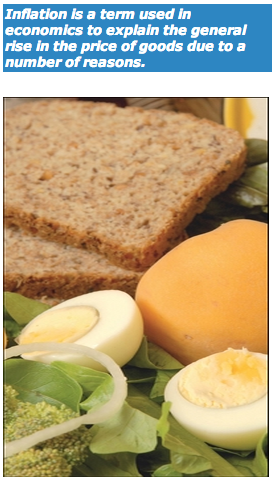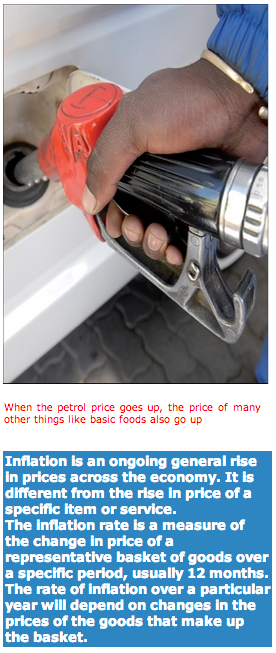ECONOMIC LITERACY
WHAT IS INFLATION AND HOW DOES IT AFFECT US?
Last year, food prices in South Africa increased by over 10 per cent. The price of a 12,5 kilogram bag of mealie meal, for example, increased from R37 to R49.
The prices of other basic foods like soya beans, wheat and rice also increased. This was mainly caused by the poor weather conditions in 2006 resulting in food crops failing and by the rise in the petrol price.
Petrol price
When the petrol price rises, transport costs also rise, and when transport costs rise, the price of many other things go up. This is because goods like food have to be transported all over the country.
Another factor that makes food prices rise, is the growing need for basic foods. The need for food is growing because the country's population is growing.
There are also more people who are able to buy food because there are more jobs available. In the past five years, about 1,5 million new jobs were created.
Foreign money
South Africa buys oil and petrol from other countries, and those countries decide on the price. In addition, the price of such goods is set against the American dollar. Every day on television and radio the price of a single dollar is given. For example, one dollar now costs around R8.
When the dollar is weak and the rand is strong, it is cheaper for us to buy those goods. But, if the dollar is strong and the rand is weak, the prices of those goods will be higher.
What we can do
All of us can do something, no matter how small, to lower the negative effects of inflation in our lives. 
You can, for example, start a vegetable garden in your yard to meet some of your food needs.
To save petrol, government has been advising people to form lift clubs and to use public transport rather than using their own cars. This also saves on household money. In addition, traffic on the roads will be less, which will help people to get to work on time. Lateness reduces productivity in the workplace and is costing the economy millions of rands daily.
- Muzi Mkhwanazi
Shower instead of taking a bath. It can save up to R160 per year



 Facebook
Facebook Twitter
Twitter WhatsApp
WhatsApp